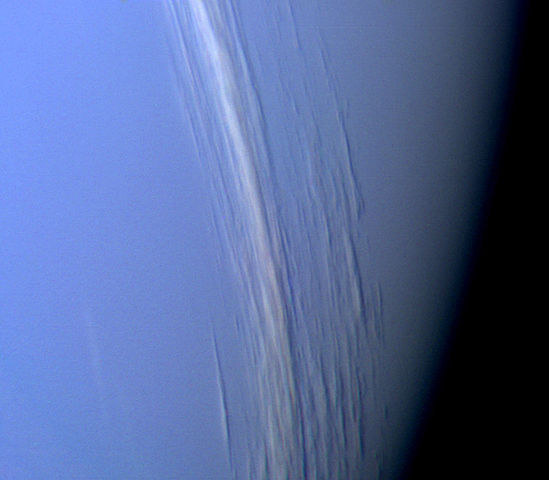
File:Neptune clouds.jpg

| |
This is a file from the Wikimedia Commons. Information from its description page there is shown below.
Commons is a freely licensed media file repository. You can help. |
| Description |
English: This Voyager 2 high resolution colour image, taken 2 hours before closest approach, provides obvious evidence of vertical relief in Neptune's bright cloud streaks.
These clouds were observed at a latitude of 29 degrees north near Neptune's east terminator. The linear cloud forms are stretched approximately along lines of constant latitude and the Sun is toward the lower left. The bright sides of the clouds which face the Sun are brighter than the surrounding cloud deck because they are more directly exposed to the sun. Shadows can be seen on the side opposite the sun. These shadows are less distinct at short wavelengths (violet filter) and more distinct at long wavelengths (orange filter). This can be understood if the underlying cloud deck on which the shadow is cast is at a relatively great depth, in which case scattering by molecules in the overlying atmosphere will diffuse light into the shadow. Because molecules scatter blue light much more efficiently than red light, the shadows will be darkest at the longest (reddest) wavelengths, and will appear blue under white light illumination. The resolution of this image is 11 kilometers (6.8 miles per pixel) and the range is only 157,000 kilometers (98,000 miles). The width of the cloud streaks range from 50 to 200 kilometers (31 to 124 miles), and their shadow widths range from 30 to 50 kilometers (18 to 31 miles). Cloud heights appear to be of the order of 50 kilometers (31 miles).Deutsch: Dieses hochauflösende Farbbild von Voyager 2, das 2 Stunden vor der größten Annäherung an den Planeten aufgenommen wurde, zeigt auffällige Hinweise für das vertikal Relief in Neptuns hellen Wolkenstreifen.
Diese Wolken wurden auf einer Breite von 29° nordöstlich von Neptuns östlicher Begrenzung beobachtet. Die linearen Wolkenformen sind ungfähr entlang der Linien der nordsüdlichen Breite gestreckt und die Sonne befindet sich auf der unteren linken Seite. Die hellen Seiten der Wolken, die sich in Richtung der Sonne befinden, sind heller als die umgebende Wolkendeck, da sei von der Sonne angestrahlt werden. Schatten können an der Seite, die der Sonne abgewandt sind, gesehen werden. Diese Schatten sind bei kurzen Wellenlängen (violettes Filter) weniger deutlich und auffälliger bei längeren Wellenlängen (oranges Filter). Dies kann verstanden werden, wenn die darunterliegende Wolkendecke, auf denen die Wolken ihre Schatten werfen, sich relativ tief aufhalten. In diesem Fall zerstreuen Moleküle in der überlagernden Atmosphäre das Licht und die Schatten werden unschärfer. Da Moleküle das blaue Licht effizienter als rotes Licht streuen, sind die Schatten bei den längeren (roten) Wellenlängen am dunkelsten und erscheinen bei heller Beleuchtung blau. Die Auflösung diese Bildes beträgt 11 Kilometers pro Pixel und der Bereich ist nur 157.000 Kilometer. Die Breite der Wolkenstreifen umfasst 50 bis 200 Kilometer und die Breiten ihrer Schatten reichen von 30 bis 50 Kilometer. Die Höhe der Wolken erscheinen in der Größenordnung von 50 Kilometer zu liegen. |
||||||
| Date | 25 August 1989 | ||||||
| Source | http://photojournal.jpl.nasa.gov/catalog/PIA00058 | ||||||
| Author | NASA / Jet Propulsion Lab | ||||||
| Permission ( Reusing this file) |
|
| This image or video was catalogued by Jet Propulsion Lab of the United States National Aeronautics and Space Administration (NASA) under Photo ID: PIA00058. This tag does not indicate the copyright status of the attached work. A normal copyright tag is still required. See Commons:Licensing for more information. |
File usage
Metadata
| Orientation | Normal |
|---|---|
| Horizontal resolution | 72 dpi |
| Vertical resolution | 72 dpi |
| Software used | Adobe Photoshop 7.0 |
| File change date and time | 13:10, 22 March 2004 |
| Colour space | Uncalibrated |
Background information
SOS Children chose the best bits of Wikipedia to help you learn. Thanks to SOS Childrens Villages, 62,000 children are enjoying a happy childhood, with a healthy, prosperous future ahead of them. Sponsoring a child is a great way to help children who need your support.



